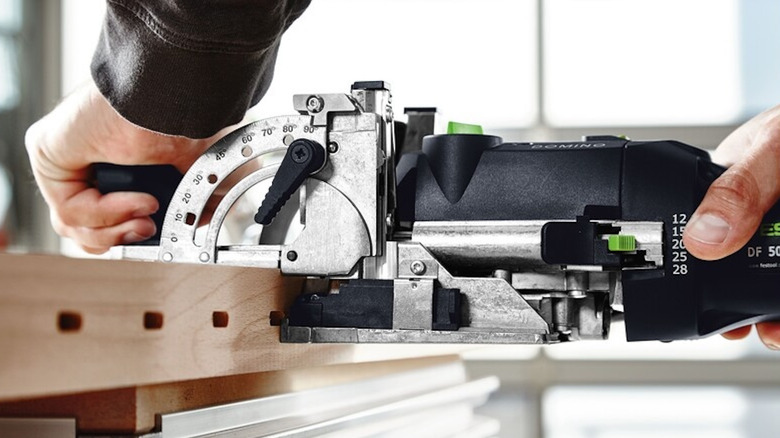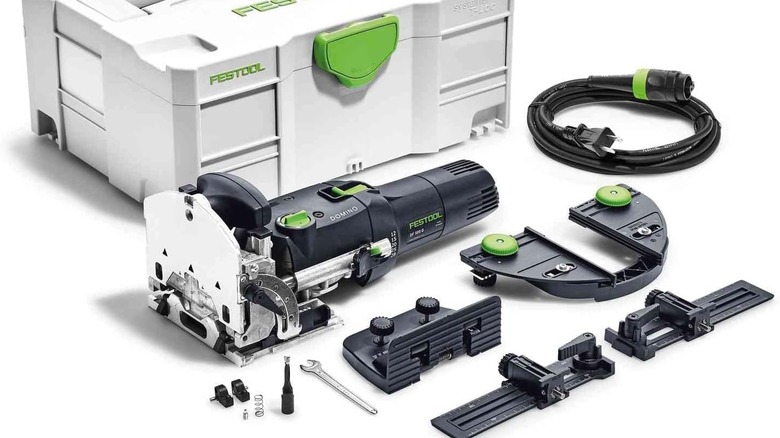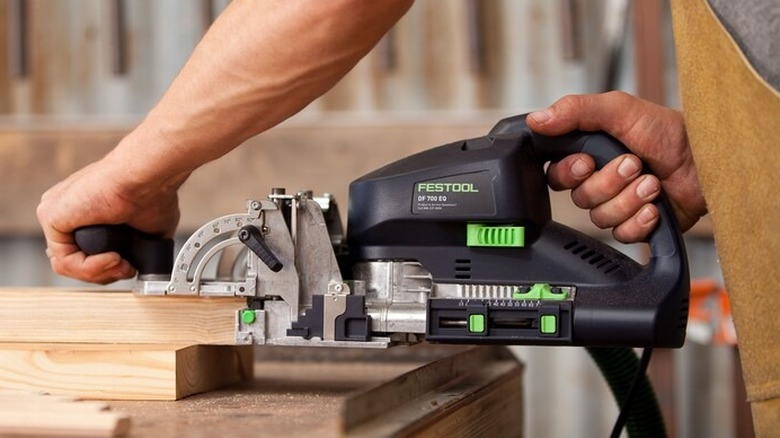Is The Festool Domino Joiner Woodworking Tool Worth Buying? Here's What The Reviews Say
We may receive a commission on purchases made from links.
Sooner or later, every woodworker looks for a more attractive and stronger way of joining two pieces of wood than nails or screws. Pocket hole joinery is popular because the jigs are relatively inexpensive, and there are plenty of tips for perfect pocket holes during any DIY wood project. However, they only work when joining boards at 90-degree angles.
If you want to join boards edge to edge when making a tabletop, for example, you could use a low-cost dowel jig. A step up from this, providing greater speed and accuracy, is a power tool called a biscuit joiner (also known as a plate joiner). The Festool Domino Joiner uses a similar principle to these but creates mortise and tenon-type joints, which they claim provide greater strength than dowels or biscuits because there's more glue surface.
Festool has a stellar reputation for quality and is regularly one of the best power tool brands ranked in independent reviews. However, the Festool Domino Joiner DF 500 Q retails for around $1,300, and the XL DF 700 EQ is listed at $1,749. Both are major investments, so is it worth buying? For home woodworkers, the answer leans toward no, but although we'd like to be able to give a straight yes or no answer, it's not as simple as that. We need to look more closely at what the Festool Domino Joiner does and consider what the reviews have to say.
The Festool Domino Joiner certainly gets some great reviews
Both Festool Domino Joiners are supplied as a kit, rather than just a tool, and the accessories certainly add value. Even the case it all comes in is a high-quality item. The Trim Stop is particularly useful for narrow pieces, whereas the Cross Stop allows you to make repetitive cuts along a board while only needing to measure once. Mortises of different widths and depths can be set, and although most joints will be made either at 180 or 90 degrees, the adjustable base plate allows any angle between them to be used.
Feedback we got from one trade professional tells us that this isn't a tool you work with straight out of the box, but the short learning curve was really only acclimating to the various settings. Over at Amazon, where the DF 500 Q gets a 4.8-star rating, one buyer advised, "Practice on a couple of scrap pieces before you do your project." Always a good idea with a new tool.
The overwhelming majority of feedback is hugely positive. Typical comments include "Definitely a must have for a serious woodworker" and "Yes, it's worth it." One independent review called it "hands down the fastest, strongest, and most accurate joinery machine available on the market."
Why a Festool Domino Joiner is probably not for you
Complaints about the performance are almost unheard of. One or two buyers were disappointed that you only get one bit (cutter) included, and spares are likely close to $70. You are also obliged to use Festool-type tenons, although these are widely available, and you can buy router cutters to make your own.
These things are just small potatoes, though. The big issue is the price. For comparison, the Kreg K4 Pocket Hole Jig comes from the market leader for that type of joinery and costs $99. If you've been wondering whether it's worth buying a biscuit joiner tool as an alternative, you can pick up the highly rated DeWalt Max XR cordless model for under $300. For most home woodworkers, the Festool Domino Joiner is categorically not worth it, regardless of what reviews say.
That doesn't mean the reviews are wrong, but they are one-sided. They are almost entirely from professionals who want to make quick, accurate, and strong joints, either in the workshop or on site. For them, the Festool Domino Joiner may well be worth the investment. Most woodworkers don't need that kind of performance, and there are much cheaper alternatives that will produce perfectly adequate results.


